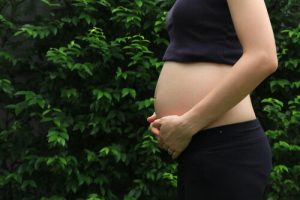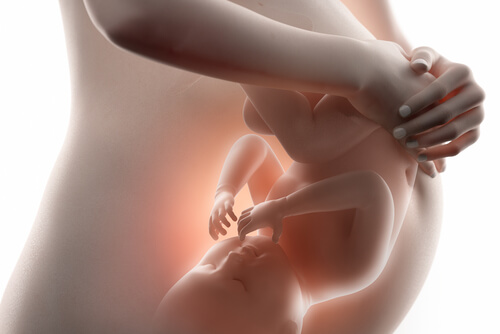The 20th Week of Pregnancy

Today, we’ll tell you everything that happens to the baby and to the mother’s body in the 20th week of pregnancy.
This week marks the midpoint of gestation. At this time, the key controls are in place and the ultrasound can show the baby’s sex.
The baby in the 20th week of pregnancy
The nine months of gestation imply a real miracle. Week by week, both the fetus and the mother’s body are changing. That’s why it’s important to know what is happening.
In the 20th week of pregnancy, you’ve reached the halfway mark. The morphology and proportions of the baby are already completely human, and you can perceive its movement and some kicks.
What is the baby’s weight and size?
At this time, the baby is about 21 centimeters long, about the size of a banana. It weighs between about 250 to 300 grams. From now until the end of pregnancy, the baby’s weight will increase by about 10 times, and the size will double.
What the baby feels and how it develops
Inside the mother’s womb, the child can already hear, although the sounds are somewhat distorted by the amniotic fluid that protects it. The baby listens to the mother’s heartbeat and voice, as well as its own heart. The baby can even perceive the mother’s emotions.

In the brain, the sensory areas develop: smell, taste, sight and hearing. That’s why the baby perceives light, swallows, urinates and is able to recognize music.
The organs and their appearance
In addition to the senses, the baby’s brain already has 30 billion neurons. The stomach, liver and intestines are already contained in the abdominal cavity, and the lungs and digestive tract are maturing.
The toes and fingers have formed and are very flexible. The foundations of the teeth are in place. The baby has hair on its head and thin eyebrows.
In the 20th week of pregnancy, the morphology and proportions of the baby are totally human, and you can perceive its movement and some kicks.
Hiccups in the baby?
It’s normal for the mother to feel rhythmic beatings from time to time. This is because the baby may have hiccups while in the belly. Don’t worry too much about it. It occurs because the diaphragm hasn’t matured yet and therefore suffers spasms.
What happens to the mother
By the 20th week of pregnancy, the maternal uterus is three times its original size. Generally, the upper part reaches the same level as the navel. The belly widens, grows and can already be distinguished.
Symptoms in the mother’s body
- Greater fatigue. This is normal, since the baby and uterus grow and the force of gravity shifts. You may also feel more sleepy and need to rest more often.
- Hypotension: low blood pressure due to the pressure exerted by the uterus on the aorta.
- Varicose vein onset: especially if the woman is prone to them. To avoid varicose veins, the use of special socks and a regular leg rest is recommended.
- The heart rate accelerates because more blood is pumped through the body.
- The gums become inflamed and bleed. Hormonal changes cause the gums to react differently to bacteria.
Ultrasound and analysis
In the 20th week of pregnancy, a detailed ultrasound is performed that evaluates the baby’s morphological parameters.
In this anatomical scan, the doctor checks the development of the organs (heart, structure of the head, kidneys, spine, stomach). In addition, the doctor checks the placenta and the amniotic fluid.

The ultrasound can also show the baby’s sex. In addition, this check-up includes a blood test and the search for anti toxoplasmosis antibodies.
Recommendations
- Don’t stand for more than three hours, and rest whenever necessary.
- Eat food that contains iron: it helps the baby’s development and maintains adequate oxygen levels.
- Listen to music and sing to your baby. Music can be an excellent means of connection with the mother. It’s a source of encouragement and well-being for both.
- Maintain proper oral hygiene to avoid discomfort in the gums.
Above all, it’s important to stay calm. Anxiety and tranquility are sensations that the baby already perceives in the womb. If the mother is nervous, this will also be transmitted to the child.
In short, it’s very beneficial to take care of the baby and your own body in order to enjoy the gestational period.
Today, we’ll tell you everything that happens to the baby and to the mother’s body in the 20th week of pregnancy.
This week marks the midpoint of gestation. At this time, the key controls are in place and the ultrasound can show the baby’s sex.
The baby in the 20th week of pregnancy
The nine months of gestation imply a real miracle. Week by week, both the fetus and the mother’s body are changing. That’s why it’s important to know what is happening.
In the 20th week of pregnancy, you’ve reached the halfway mark. The morphology and proportions of the baby are already completely human, and you can perceive its movement and some kicks.
What is the baby’s weight and size?
At this time, the baby is about 21 centimeters long, about the size of a banana. It weighs between about 250 to 300 grams. From now until the end of pregnancy, the baby’s weight will increase by about 10 times, and the size will double.
What the baby feels and how it develops
Inside the mother’s womb, the child can already hear, although the sounds are somewhat distorted by the amniotic fluid that protects it. The baby listens to the mother’s heartbeat and voice, as well as its own heart. The baby can even perceive the mother’s emotions.

In the brain, the sensory areas develop: smell, taste, sight and hearing. That’s why the baby perceives light, swallows, urinates and is able to recognize music.
The organs and their appearance
In addition to the senses, the baby’s brain already has 30 billion neurons. The stomach, liver and intestines are already contained in the abdominal cavity, and the lungs and digestive tract are maturing.
The toes and fingers have formed and are very flexible. The foundations of the teeth are in place. The baby has hair on its head and thin eyebrows.
In the 20th week of pregnancy, the morphology and proportions of the baby are totally human, and you can perceive its movement and some kicks.
Hiccups in the baby?
It’s normal for the mother to feel rhythmic beatings from time to time. This is because the baby may have hiccups while in the belly. Don’t worry too much about it. It occurs because the diaphragm hasn’t matured yet and therefore suffers spasms.
What happens to the mother
By the 20th week of pregnancy, the maternal uterus is three times its original size. Generally, the upper part reaches the same level as the navel. The belly widens, grows and can already be distinguished.
Symptoms in the mother’s body
- Greater fatigue. This is normal, since the baby and uterus grow and the force of gravity shifts. You may also feel more sleepy and need to rest more often.
- Hypotension: low blood pressure due to the pressure exerted by the uterus on the aorta.
- Varicose vein onset: especially if the woman is prone to them. To avoid varicose veins, the use of special socks and a regular leg rest is recommended.
- The heart rate accelerates because more blood is pumped through the body.
- The gums become inflamed and bleed. Hormonal changes cause the gums to react differently to bacteria.
Ultrasound and analysis
In the 20th week of pregnancy, a detailed ultrasound is performed that evaluates the baby’s morphological parameters.
In this anatomical scan, the doctor checks the development of the organs (heart, structure of the head, kidneys, spine, stomach). In addition, the doctor checks the placenta and the amniotic fluid.

The ultrasound can also show the baby’s sex. In addition, this check-up includes a blood test and the search for anti toxoplasmosis antibodies.
Recommendations
- Don’t stand for more than three hours, and rest whenever necessary.
- Eat food that contains iron: it helps the baby’s development and maintains adequate oxygen levels.
- Listen to music and sing to your baby. Music can be an excellent means of connection with the mother. It’s a source of encouragement and well-being for both.
- Maintain proper oral hygiene to avoid discomfort in the gums.
Above all, it’s important to stay calm. Anxiety and tranquility are sensations that the baby already perceives in the womb. If the mother is nervous, this will also be transmitted to the child.
In short, it’s very beneficial to take care of the baby and your own body in order to enjoy the gestational period.
All cited sources were thoroughly reviewed by our team to ensure their quality, reliability, currency, and validity. The bibliography of this article was considered reliable and of academic or scientific accuracy.
- Purizaca, Manuel. “Modificaciones fisiológicas en el embarazo.” Revista peruana de Ginecología y Obstetricia 56.1 (2010): 57-69.
- Cáceres, Rocío, et al. “Efectos neurobiológicos del estrés prenatal sobre el nuevo ser.” Revista chilena de neuro-psiquiatría 55.2 (2017): 103-113.
- Hernández, Ulises Reyes, et al. “Música de Mozart y su efecto antiestrés en la etapa prenatal.” Boletín Clínico Hospital Infantil del Estado de Sonora 23.2 (2006): 85-92.
- Rana, Mandeep, et al. “Sueño en los niňos: fisiología y actualización de los últimos conocimientos.” MEDICINA (Buenos Aires) 79.Supl III (2019): 25-28.
This text is provided for informational purposes only and does not replace consultation with a professional. If in doubt, consult your specialist.








